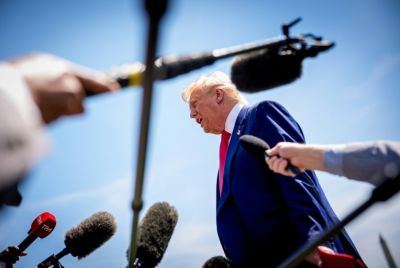Can China Instead Of The IMF Save Lebanon’s Crippled Economy?
KEY POINTS
- Hezbollah has been condemned as a terrorist organization by the U.S. and European Union
- Beirut is currently negotiating a $10 billion bailout with IMF
- The Lebanese economy is expected to shrink by 12% this year
The chief of Hezbollah said he prefers that the debt-ridden country of Lebanon receive a financial bailout and investments from China rather than from the International Monetary Fund.
Hassan Nasrallah, the secretary-general of Hezbollah, a Shiite organization with great power in Lebanon, claimed China is willing to invest in major infrastructure projects in Lebanon and potentially save its teetering economy.
“Chinese companies are ready to inject money into this country,” Nasrallah said during a speech on Hezbollah’s Al-Manar television station.
He specified such projects may include a revival of coastal railway running from Naqoura on Lebanon’s southern border with Israel up to Tripoli on the northern border with Syria.
“If this happened, it would bring money to the country, bring investment, create job opportunities, allow heavy transport, and so on,” the Shiite leader said.
Nasrallah also said the Chinese want to construct a new electricity plant in Lebanon. The electricity industry in Lebanon is highly corrupt, inefficient and wasteful and runs up annual debts of $1 billion.
Although China has expressed interest in the Lebanese port of Tripoli, Beijing has thus far avoided getting heavily involved in the country as the U.S. upgrades sanctions against Syria and Iran, Hezbollah’s allies.
Hezbollah has been condemned as a terrorist organization by the U.S. and European Union.
Nonetheless, Nasrallah believes China would make a better financial partner than the IMF. (Beirut is currently negotiating a $10 billion bailout with IMF).
“I say to the Lebanese people, there are alternatives,” he added.
Meanwhile, as prices skyrocket, foreign reserves decimated and the middle class on the verge of collapse, Lebanon’s economy is in dire straits. In March, Lebanon defaulted on a $1.2 billion Eurobond payment.
The Lebanese economy is expected to shrink by 12% this year, while one-half of the government’s budget will go to service a debt burden that has now risen to 170% of gross domestic product – the highest such ratio in the world. The unemployment rate has reached 35%.
When the covid-19 pandemic broke out in Lebanon earlier this year, China quickly stepped in to ship medical supplies and equipment.
“The Chinese donation clearly reflects the solidity and depth of the relationship between the two peoples and the two armies,” said Wang Kejian, China’s ambassador to Lebanon. “China is ready to work with the Lebanese people and army to overcome the difficulties and troubles. After all the difficulties and obstacles have been cleared, new roads and horizons will open up.”
Chinese business delegations to Lebanon have offered to build highways, solar power plants and other infrastructure.
Some 40% of goods imported into Lebanon already come from China – at a value of $2 billion.
Danielle Pletka, senior fellow at the American Enterprise Institute, wrote: “While the Islamic Republic of Iran is still calling the political shots [in Lebanon], vultures from Beijing are circling, eyeing tasty infrastructure assets like ports and airports as well as soft power influence through Lebanon’s universities. Meanwhile, Lebanon as a sovereign nation collapses.”
But Dr. Massoud Daher, head of the Chinese-Lebanese Friendship and Cooperation Committee, does not think Beijing is seeking to gain any political influence in Lebanon.
“China is interested in marketing its products in such a way that both parties can benefit from. Lebanon is an economically distressed country and does not constitute an important market for China,” he said. “The problem is that the money of the Lebanese people is blocked in banks and the economy is in recession. China sells us its products at attractive prices, but how can the products be marketed in a country whose purchasing power is declining on a daily basis?”
Zhang Jian Wei, director-general of the Department of West Asia and North Africa at the International Liaison Department of the Central Committee of the Communist Party of China, also denied the Chinese want to gain dominance in Lebanon.
“We do not intend to replace the United States in Lebanon and we do not have the capacity to do so because China is still a developing country,” Zhang said. “Even if China becomes more developed economically, it will not seek to fill any vacuum in Lebanon.”
Meanwhile, some analysts observe that any bailout from the IMF must come in tandem with a weakening of Hezbollah.
Raphael Badani, a geopolitical consultant specializing in risk and intelligence analysis of the Middle East and Asia, warned that Lebanon is on the verge of collapse.
“Since October 2019, when [anti-government] protests began, the Lebanese lira sunk by 40%, making it nearly impossible for the government to pay off its $33 billion foreign debt,” he wrote. “Lebanon has been ravaged by corruption and fraud, largely tied to Hezbollah’s leadership, thrusting it into its worst economic crisis since the civil war ended in 1990.”
Professor Habib Malik of the Lebanese-American University, said Hezbollah’s presence badly hurts Lebanon’s economy.
“Hezbollah’s own personal involvement [is] in corruption,” he said. “The mere fact that they actually protect and cover up for well-known corrupt individuals and groups, that’s enough to implicate them in the whole corruption thing.”
Charlie Weimers, a member of the European Parliament’s Foreign Affairs Committee, wrote: “In Europe, Hezbollah is known for its criminal activities, including money-laundering, drug trafficking, counterfeit currency and clothing, as well as fundraising and recruiting people for its so-called ‘charity’ programs.”
Now the coronavirus pandemic has made things even worse in Lebanon.
In the past, Hezbollah has blocked IMF grants out of fear that accepting such money would lead to political, banking and structural reforms.
Now however, as Hezbollah’s principal benefactor Iran is crippled by western sanctions, the militant group may be forced to accept IMF financing.
“To effect real change in Lebanon, Hezbollah’s political power must be diminished,” Badani wrote. “The bailout terms set so far by the IMF are an important step in the right direction, but further conditions and monitoring mechanisms are needed to prevent the money from funding subversive and violent causes… Hezbollah’s waning power offers the IMF a chance to introduce political reforms that will support lasting change and recovery in the country.”
For now, Lebanon is on the ropes.
Nicolas Chammas, the chief of the Beirut Traders Association, said 25% of private sector businesses in the capital city have already closed this year. He projected a similar number of businesses will close over the next six months.
Chammas also expressed pessimism over Lebanon’s ability or willingness to carry out the reforms demanded by the IMF in exchange for the bailout.
© Copyright IBTimes 2024. All rights reserved.




















